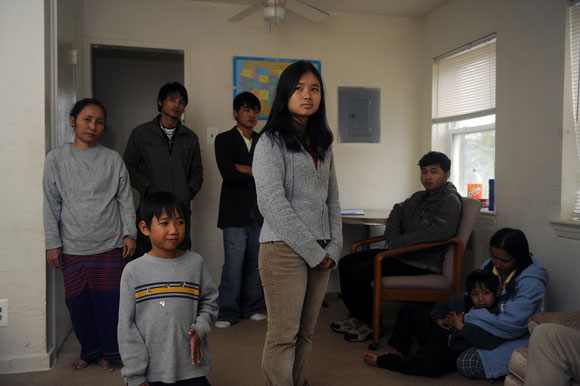
Refugees from Burma, Boe Meh, center, 18, posed for a photograph with her mother, Hlee Meh, far left, and other family members, Soe Reh, second from the left, at their apartment in Pennsauken, New Jersey. (Jose Moreno / For The Salt Lake Tribune)
By Kristen Moulton | The Salt Lake Tribune
Seventeen-year-old Boe Meh had one goal when she arrived in southern New Jersey in July: going to school.
If she learned English in class, Meh figured, she’d be able to help her family and other Burmese refugees.
But months later, she and her 16-year-old brother were still not enrolled, due to glitches at Catholic Charities of Camden, the agency that resettled them.
Baptist minister Rev. James Kang said in mid-November that he knew of 14 refugee children in the Camden area, from age 8 to 18, who were still waiting to go to class months after resettlement. “They are very anxious, and they want to go to school,” he said.

To enroll, children must be immunized and have a rental agreement to prove residency. Families depend on resettlement workers for help in getting the paperwork and vaccinations.
Catholic Charities did not dispute that more than a dozen youngsters and teens were not in school as of early December. But spokesman Andy Walton said he expected most of them children to be in school this month.
An unusually high caseload led to the delays, he said. Catholic Charities resettled 340 refugees in the Camden area in the past year, and of the 101 children, 86 were in school when classes began in September. “There have been a few isolated cases that took longer than normal,” Walton said.
The agency hired more caseworkers and is trying to line up another health provider near where most of the refugees live, he said.
“We want them enrolled as soon as possible after their arrival, but not before these steps [family applications for food stamps, immunizations and health screenings] can be taken,” he said.
Meh’s family of six are Karenni refugees who spent 11 years in a camp in Thailand before they were settled in Pennsauken. Her father and two older brothers had jobs, and the family wanted her to get an education. They feel the delays break promises made to them in the camp, she said.
Speaking through interpreter Myra Dahgaypaw in November, Meh said her family’s caseworker has put off pleas to enroll her and her younger brother, Day Reh. The caseworker wants Meh, who turned 18 in September, to get a job, and steered her toward an opening at Walmart.
“He kept telling her she’s been here long enough and she has to work,” Dahgaypaw said.
Walton responded that it is typical for refugees who are 17 to get jobs or enroll in adult education classes, rather than public school. And Catholic Charities is awaiting word from a school that had concerns about Day Reh’s English proficiency, and may encourage adult education for him as well, Walton said.
Kang said volunteers were trying to help both children enroll in public schools, but the effort became moot last weekend. The family abruptly moved to Colorado on the invitation of an uncle, Kang said.
Life had been difficult in New Jersey, with one of Meh's older brothers and her father working at a Wal-mart that was a three-hour bus ride away from their apartment. At times, they bunked with other refugees nearer their jobs.
Now, the family is starting over once again.